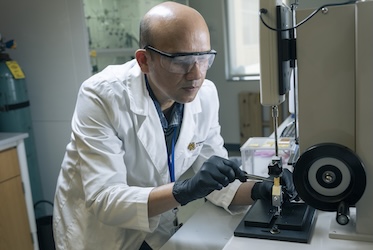
Biochemistry professor awarded NIH grant
KENNESAW, Ga. | Jun 11, 2019
Award to further develop cell-penetrating peptide technology
Jonathan McMurry, professor of biochemistry at Kennesaw State, received a three-year $395,000 grant from the National Institutes of Health to improve cell-penetrating peptide (CPP) technology.
This is a renewal of McMurry’s original grant, making it the eighth NIH award – totaling nearly $2.5 million – that he has received since joining the KSU faculty in 2006.
CPPs, short chains of amino acids, allow various molecules such as DNA or therapeutic proteins to enter cells to fight infection. Through his research, McMurry is finding ways to deliver specific biomolecular therapeutics to cells, efficiently and effectively, in an effort to combat disease.
“Biomolecules that represent important therapeutic leads are often impractical because they cannot reach their targets, most commonly because of failure to cross cell membranes and reach appropriate subcellular destinations,” said McMurry, who also serves as associate vice president for research at KSU. “Cell-penetrating peptides (CPPs) hold great promise for overcoming these failures.”
One of the challenges is that CPPs and the biomolecular cargo it is transporting gets trapped in undesired locations of the cell, which prevents the cargo from reaching its destination, the cell nucleus.
However in 2015, with initial funding from NIH, McMurry led a research team of KSU faculty and students which developed a CPP adaptor protein. Called TAT-CaM, this adaptor protein was created by mixing a viral protein fragment with the human protein Calmodulin. Upon entering the cell membrane, TAT-CaM would release its biomolecular cargo to the cell’s inner core before becoming trapped.
According to McMurry, with this additional funding he can delve deeper into the mechanisms, kinetics and other basics of CPP biology and develop methods to use the CPP-adaptors to deliver other types of proteins such as nucleic acids (DNA or RNA) to the cell’s nucleus for research and therapeutic purposes.
McMurry said that billions of dollars have been invested in RNA therapeutics to combat disease such as cancer by preventing the production of specific proteins that control cell growth. These treatments are still in development because they cannot get into the cells very well, but that may change with the CPP-adaptor technology.
“I’m thrilled that the NIH has entrusted my group once again with the support to do the proposed work, which if successful, could open up an entirely new way to deliver biomolecular therapeutics,” he said.
– Joëlle Walls
Photos by Jason Getz
Related Stories

Kennesaw State researcher tackling sustainability through use of transparent wood

Chemistry student engaged in sustainable catalyst research through Kennesaw State's First-Year Scholars program

Kennesaw State researchers awarded Department of Energy grant to investigate materials that boost energy-efficient technologies

Kennesaw State physics student awarded Goldwater Scholarship
A leader in innovative teaching and learning, Kennesaw State University offers undergraduate, graduate, and doctoral degrees to its more than 47,000 students. Kennesaw State is a member of the University System of Georgia with 11 academic colleges. The university’s vibrant campus culture, diverse population, strong global ties, and entrepreneurial spirit draw students from throughout the country and the world. Kennesaw State is a Carnegie-designated doctoral research institution (R2), placing it among an elite group of only 8 percent of U.S. colleges and universities with an R1 or R2 status. For more information, visit kennesaw.edu.
















